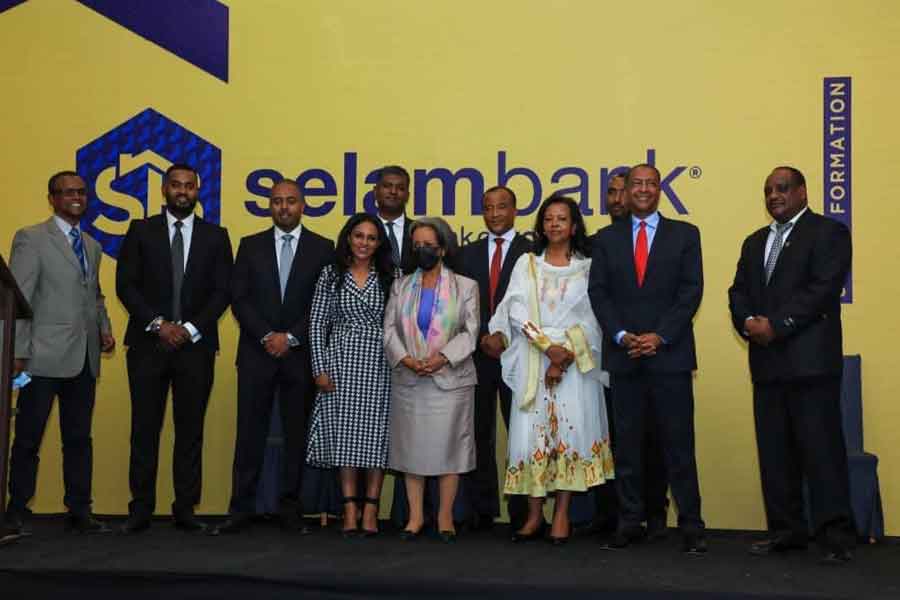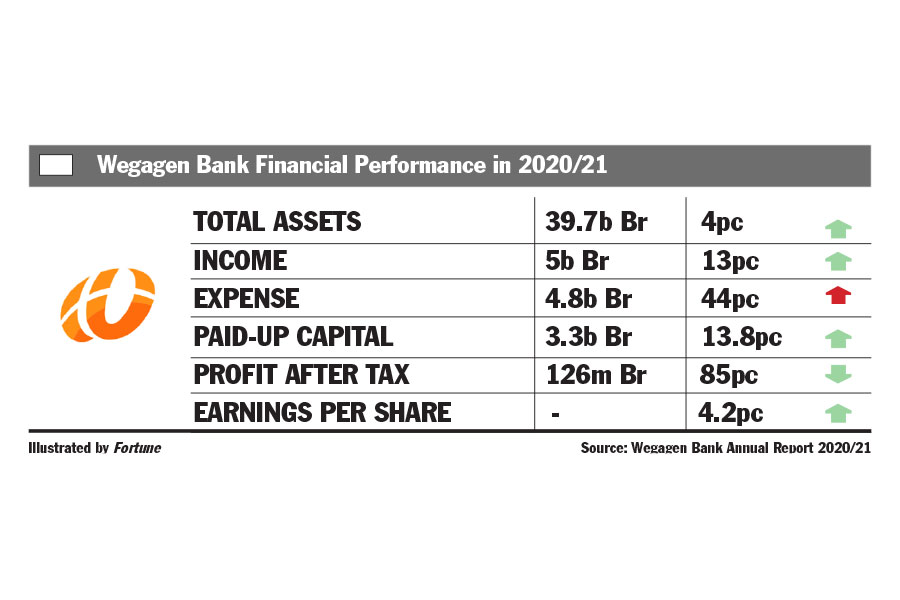
Radar | Jan 03,2021
Eth-Switch S.C., the operator of the national electronic retail payments switch, netted 24.3 million Br in profit over the last fiscal year, a 93pc rise from the preceding year. The company, which had been operating at a loss for three years running, registered a positive performance for the second consecutive year.
Clearing the accumulated losses, the company has availed a little over nine million Birr to be distributed as a dividend for its 55 shareholders, which include the National Bank of Ethiopia, the Development Bank of Ethiopia, all of the commercial banks and microfinance institutions. Of the members, 22 are institutions.
Commencing operations in 2015 to integrate the national electronic payment system with a registered capital of 80 million Br, the company has also been able to raise its paid-up capital to 234 million Br, registering eight percent growth. Its income has also grown to 94.5 million Br, 83pc of which was generated from the general business and the remainder from interest.
One year ago, the Bank decided to raise its capital to 600 million Br and allocated shares that the shareholders were to pay for by April 30, 2020. However, only a few banks responded to the call, according to Tiruneh Mitafa, board chairperson of the company and former vice governor at the central bank.
"There was even a bank that informed us of its unwillingness to buy shares," said Tiruneh.
However, the board chairperson urged the shareholders to pay the values since the new law from the central bank compelled the company to raise its paid-up capital to 300 million Br.
During the reporting period, a little over 99 million automated teller machine (ATM) transactions worth 87 billion Br were made, out of which over 13 billion Br worth were interbank transactions facilitated by Eth-Switch. The figure depicted a 47pc increase compared to the previous fiscal year. Of the total transactions, 82pc of them were successful.
The total assets of Eth-Switch reached 273 million Br, displaying a growth of 23pc. Its liability has also risen by 48pc to 27.8 million Br.
A few months ago, the company launched the interoperability of PoS, enabling a cardholder with a payment card issued by any bank to make payments at any point-of-sale (PoS) terminal. So far, 13 banks have integrated their PoS terminals through point-of-sale interoperability.
Four years ago, it had already integrated ATM terminals of all banks, enabling customers to withdraw money at their convenience. Fifteen million cards have been issued by commercial banks, which operate close to 5,000 ATM and 10,000 PoS terminals.
The increase in transaction volume and the increment in the payment for transactions were achieved following the formation of two task forces drawn from banks to follow up on the execution of PoS and ATM interoperability, according to Yilebes Addis, the second CEO of the company who replaced the founding head, Bizuneh Bekele. Operating with 54 employees, Eth-Switch has issued a total of 256,086 Ethio-Pay cards.
The Novel Coronavirus (COVID-19) has posed both opportunities and threats to the company, according to Yilebes.
The pandemic has made people start using the digital banking system more, according to Yilebes. At the same time, the ATM transaction fee has been waived by all banks to encourage people to use ATM and PoS terminals to avoid in-person visitation of banks as a means to limit the spread of the virus.
Last year was remarkable since the government had enacted different laws that promote a digital economy and electronic banking systems, according to Yilebes.
A few months ago, the Ministry of Innovation & Technology drafted an electronic transaction proclamation legislated by the parliament. The National Bank of Ethiopia has also issued additional laws, including those for payment instrument issuers and payment system operators.
"There was also a confusion in the industry, with some considering the company a competitor," said Yilebes. "But now, this has been changed, and they understand it's complementing them and not competing."
For the current fiscal year, the company has allocated a 231.5-million-Br budget for its expenditures and targets to net 45.2 million Br in profit and boost its assets to 518 million Br.
The company has also crafted a five-year strategy that applies as of the current fiscal year. The strategic document was drafted following the inquiry of the central bank and with technical support from the World Bank. The document aims to shape the company into one of the class payment networks in Africa by making payments simple and affordable.
THIS STORY HAS BEEN UPDATED AT DECEMBER 19-2020
PUBLISHED ON
Dec 12,2020 [ VOL
21 , NO
1076]

Radar | Jan 03,2021

Fortune News | Dec 19,2020

Fortune News | Feb 25,2023

Fortune News | May 29,2021

News Analysis | Nov 09,2024

Viewpoints | Jul 01,2023

View From Arada | Dec 24,2022

Radar | Oct 14,2023

My Opinion | Sep 06,2020

Fortune News | Jan 15,2022

Dec 22 , 2024 . By TIZITA SHEWAFERAW
Charged with transforming colossal state-owned enterprises into modern and competitiv...

Aug 18 , 2024 . By AKSAH ITALO
Although predictable Yonas Zerihun's job in the ride-hailing service is not immune to...

Jul 28 , 2024 . By TIZITA SHEWAFERAW
Unhabitual, perhaps too many, Samuel Gebreyohannes, 38, used to occasionally enjoy a couple of beers at breakfast. However, he recently swit...

Jul 13 , 2024 . By AKSAH ITALO
Investors who rely on tractors, trucks, and field vehicles for commuting, transporting commodities, and f...

Jun 28 , 2025
Meseret Damtie, the assertive auditor general, has never been shy about naming names...

Jun 21 , 2025
A well-worn adage says, “Budget is not destiny, but it is direction.” Examining t...

Jun 14 , 2025
Yet again, the Horn of Africa is bracing for trouble. A region already frayed by wars...

Jun 7 , 2025
Few promises shine brighter in Addis Abeba than the pledge of a roof for every family...